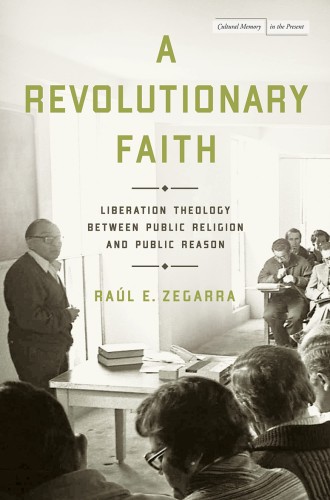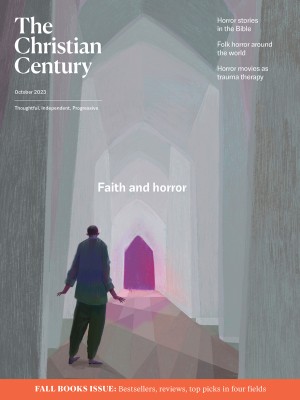Liberation theology’s public witness
Raúl Zegarra’s history is deeply researched, clearly written, and unparalleled in its attention to theory.
Among social trends anchored in the ’60s, none have been as resourcefully mobilized by Christians as situation ethics (popularized in 1966 by Joseph Fletcher) and liberation theology (articulated at the 1968 Medellín Conference in Colombia). The reach and fecundity of the latter in particular continues to winnow theological sensibilities, challenge the timid, and clarify current cultural realities.
Raúl Zegarra is a postdoctoral fellow at the University of Chicago and a faculty colleague of the now 95-year-old Gustavo Gutiérrez—author of the classic A Theology of Liberation—at Pontificia Universidad Católica del Perú. Zegarra finds in liberation impulses not only the leading edge of Christian witness but the mirror in which public religion and public reason can behold one another, toward their mutual edification.
Read our latest issue or browse back issues.
Because the quest for liberation is a nesting place for transcendent faith and ethical commitment as well as a launchpad for political hope, Zegarra roots his discussion in such intellectual luminaries as Jacques Maritain, Paul Ricoeur, David Tracy, John Rawls, and Martha Nussbaum. Zegarra analyzes each of these five thinkers with care and dexterity in support of his main thesis: that liberation theology articulates and expands our best hopes for a democratic future. The optimistic tone of this book is not compromised by the last sentence of the penultimate paragraph: “The struggle continues; it never ends.”
Many analysts reject liberation theology, alleging that it misrepresents the gospel and is unrepentantly Marxist, socialist, and trending toward atheism. In the first of the book’s artfully argued and abundantly documented chapters, Zegarra lays these dubious characterizations to rest. Grounded in biblical realism as a corrective to careless utopianism, Zegarra cites Gutiérrez’s claim that there is “no one who is not affected by grace.” The “universal lordship of Christ” will not be realized in secular history, Zegarra notes, but neither will liberation theology acquiesce to a two-tiered approach to human history that divides the sacred from the profane. Following Gutiérrez, he sees in secularization not the gospel’s defeat so much as the chance to sow seeds of God’s kingdom in new and hitherto unexpected places.
While Karl Marx may be diagnostically helpful, Marxian theory lands in just the sort of “exclusive humanism” (Charles Taylor’s phrase) that liberation theology denies. Zegarra shows how Gutiérrez, in concert with Black liberation theologian James Cone, focuses on God’s solidarity with the marginalized. Zegarra refuses any easy classification of who is or may be among the poor, and this charity would seem to allow the Holy Spirit more room to work than any shortsighted simplicity.
David Tracy’s three anchoring Christian mysteries—cross, resurrection, and incarnation—add theological depth to the narrative. Zegarra notes that Tracy’s rigorous methodology, which attends to both the plurality and the ambiguity of the Christian tradition, led him eventually to add a fourth criterion, namely, the “apocalyptic of the Second Coming of Christ.” Zegarra demonstrates that this expansion of Tracy’s thought is directly traceable to Gutiérrez’s influence.
With dogged consistency, Zegarra rebuffs any heedless equation of faith and politics. Politics may be used as a means, inviting scrutiny from the social sciences, but it can never be an end. Peruvian liberation theologians never followed the terrorism of the Shining Path revolutionaries of the ’80s. At the same time, liberation theology’s relationship with the Peruvian Roman Catholic leadership was fraught, often beholden to the changing whims of the hierarchy. Zegarra’s explication of the rise of Pentecostalism throughout South America is fair-minded, welcoming, and even suggestive of how liberation theology might gain greater traction among US evangelicals.
A Revolutionary Faith never sacrifices clarity for depth. Its fulsome and evaluative notes approach 50 pages, and a helpful bibliography reflects Zegarra’s familiarity with several converging academic disciplines: ethics, hermeneutics, culture theory, Christian theology, and philosophical approaches to justice.
Those who are passingly familiar with John Rawls’s A Theory of Justice may well have their dormant enthusiasms rekindled, as Zegarra limns the redemptive overlap between Rawls and Gutiérrez. If at its genesis liberation theology was inattentive to the rigors of justice theory, it is no longer. Rawls and liberation theology arrive at the same destination—advocacy for the least and the most vulnerable—even while beginning from different points: Rawls from his foundational “original position” thought experiment and liberation theology from the God who chooses the poor.
As the sun sets on this excellent book, Zegarra quotes the title of a lecture Gutiérrez delivered in 2019, “There Is Nothing More Practical than a Good Theory.” A Revolutionary Faith excels at the theoretical level, perhaps better than any monograph in the history of liberation theology. The final six or seven pages of the book take readers to a dizzying pinnacle, plumbing Nussbaum’s expansion of Rawls’s theory as captured in her capabilities approach to ethics.
There are very few stories and anecdotes in A Revolutionary Faith. More of these might have rescued “the poor” from the anonymity into which they inevitably slip. And Zegarra mentions only in passing that one early signifier of liberation theology, its base communities, are no longer as prevalent as they once were. Another book might arise to account for the continuing sexual revolution of our time, which is of universal relevance. Zegarra’s tendency toward an uncritical valorization of secularization might be reined in by the realization—as Harvey Cox said in another ’60s staple, The Secular City (1965)—that technology is as likely to imprison as to free.
Zegarra drives toward a most cherished destination that is pondered endlessly by both philosophical and Christian ethics, namely, how might love and justice intersect? Our tentative arrival is populated by heretofore unrealized views and potentials. A Revolutionary Faith demonstrates that any discussion of “the ideas of liberation and the option for the poor” must account for economic realities and emotional capacities.






